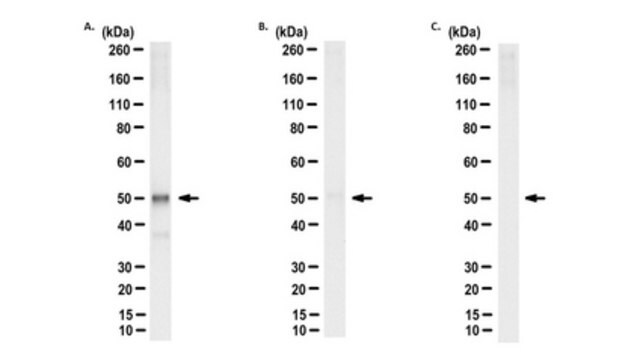您的位置:首页 > 产品中心 > Anti-phospho-PHD2 (Ser 125) Antibody, clone 4
Anti-phospho-PHD2 (Ser 125) Antibody, clone 4

产品别名
Anti-phospho-PHD2 (Ser 125) Antibody, clone 4
Egl nine homolog 1, EC:1.14.11.29, Hypoxia-inducible factor prolyl hydroxylase 2, HIF-PH2, HIF-prolyl hydroxylase 2, HPH-2, Prolyl hydroxylase domain-containing protein 2, SM-20
基本信息
| eCl@ss | 32160702 |
| General description【一般描述】 | Egl nine homolog 1 (UniProt: Q9GZT9; also known as EC:1.14.11.29, Hypoxia-inducible factor prolyl hydroxylase 2, HIF-PH2, HIF-prolyl hydroxylase 2, HPH-2, Prolyl hydroxylase domain-containing protein 2, PHD2, SM-20) is encoded by the EGLN1 (also known as C1orf12, PNAS-118, PNAS-137) gene (GeneID: 54583) in human. PHD2 acts as a cellular oxygen sensor that catalyzes, under normoxic conditions, the post-translational formation of 4-hydroxyproline in hypoxia-inducible factor (HIF) alpha proteins. It is widely expressed with highest levels in skeletal muscle and heart, moderate levels in pancreas, brain and kidney, and lower levels in lung and liver. PHD2 is mainly cytoplasmic, but it shuttles between the nucleus and cytoplasm. It hydroxylates a specific proline found in each of the oxygen-dependent degradation (ODD) domains (N-terminal, NODD, and C-terminal, CODD) of HIF1alpha and is also reported to hydroxylate HIF2alpha. PHD2 is reported to be phosphorylated on serine 125 by p70S6K and this phosphorylation increased its ability to degrade HIF1alpha. PHD2 exhibits a preference for the CODD site for both HIF1alpha and HIF1beta. Hydroxylated HIFs are then targeted for proteasomal degradation via the von Hippel-Lindau ubiquitination complex. Under hypoxic conditions, the hydroxylation reaction is attenuated allowing HIFs to escape degradation resulting in their translocation to the nucleus and heterodimerization with HIF1beta. It is one of the most important isozyme under normoxia and, through regulating the stability of HIF1, it is involved in various hypoxia-influenced processes such as angiogenesis in retinal and cardiac functionality. Defects in EGLN1 gene cause familial type erythrocytosis, an autosomal dominant disorder that is characterized by increased serum red blood cell mass, elevated serum hemoglobin and hematocrit, and normal serum erythropoietin levels. (Ref.: Di Conza, G., et al. (2017). Cell Rep. 18(7): 1699-1712). |
| Specificity【特异性】 | Clone 4 detects PHD2 in lysate of HEK293 cells overexpressing PHD2. |
| Immunogen【免疫原】 | A linear peptide corresponding to 11 amino acids surrounding Ser125 phosphorylation site from the N-terminal half of human PHD2. |
| Application【应用】 | Research Category Apoptosis & Cancer . |
| Quality【质量】 | Evaluated by Western Blotting in lysates of HEK293 cells overexpressing PHD2. Western Blotting Analysis: 1 µg/mL of this antibody detected phospho-PHD2 (Ser 125) in 10 µg of lysate from HEK293 cells overexpressing PHD2. |
| Physical form【外形】 | Protein G purified Purified mouse monoclonal antibody IgG2a in buffer containing 0.1 M Tris-Glycine (pH 7.4), 150 mM NaCl with 0.05% sodium azide. Format: Purified |
| Other Notes【其他说明】 | Concentration: Please refer to lot specific datasheet. |
产品性质
| Quality Level【质量水平】 | 100 |
| biological source【生物来源】 | mouse |
| antibody form【抗体形式】 | purified immunoglobulin |
| antibody product type | primary antibodies |
| species reactivity | , human |
| packaging【包装】 | antibody small pack of 25 μg |
| isotype【同位素/亚型】 | IgG2aκ |
| UniProt accession no.【UniProt登记号】 | Q9GZT9 |
| shipped in【运输】 | ambient |
产品说明
| Storage and Stability【储存及稳定性】 | Stable for 1 year at 2-8°C from date of receipt. |
| Disclaimer【免责声明】 | Unless otherwise stated in our catalog or other company documentation accompanying the product(s), our products are intended for research use only and are not to be used for any other purpose, which includes but is not limited to, unauthorized commercial uses, in vitro diagnostic uses, ex vivo or in vivo therapeutic uses or any type of consumption or application to humans or animals. |




